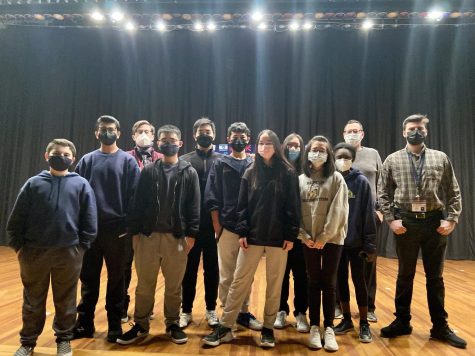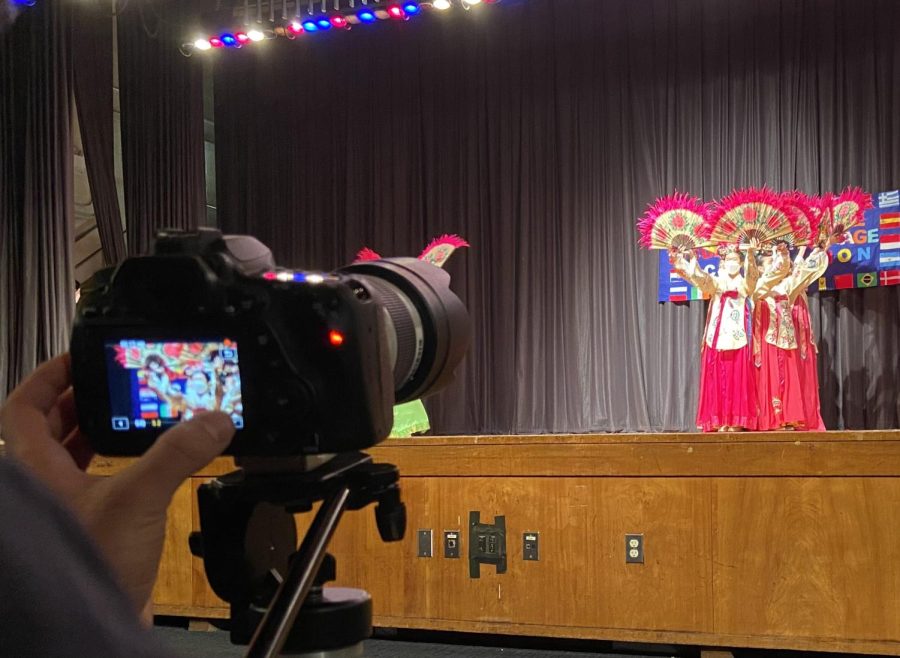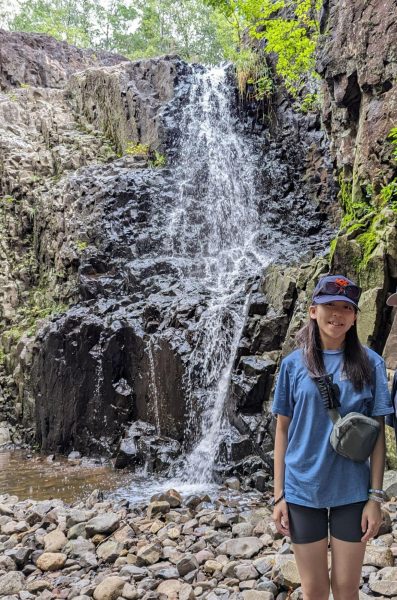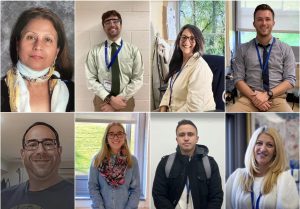Behind the Cameras: GNPS TV
A New, Hidden Spotlight—Jared Korn, a sophomore student in the Independent Study program, carefully shot the Korean-Fan act for South Middle’s annual Cultural Heritage Performance. This year, due to COVID-19 precautions, the show was staged solely for GNPS TV. He used the DSLR, a camera that allowed him to take detailed, cinematic shots.
February 18, 2022
It’s 4:30 pm. There are only three hours until the concert begins. I need to find Mr. Derych and the equipment I need to set up. He must be in Mr. Gottfried’s office, where the control center is. He’s probably setting up the mobile switcher with all the cables. I’ll take care of the wide-angle camera. I need to move quickly. Grab a fully-charged battery and the zoom attachment. Make sure that the camera is tight and snug on the tripod. After that, I need to help run the cables to all four cameras in the back. I wonder how many mics will be used tonight. Maybe I can get a copy of the program to familiarize myself with the order.
This is just the beginning of the setup for tonight’s shoot.
During school events, you’ve probably seen students running around the lobby, yelling commands, hauling film equipment, or hurrying off somewhere. These students make up GNPS TV, the educational media program at Great Neck. Under the guidance of Mr. Zahn, Mr. Derych, Ms. Busk, and Mr. Treadwell, students learn about filmmaking, television, broadcasting, and overall media literacy. This program extends to both Great Neck South and North. In South Middle school, students can take the filmmaking or television elective. They can also sign up for HTV at South Middle, the morning broadcast show, which is also at North Middle, named Blazers Live. If they decide to continue, students can take the advanced filmmaking course in high school, where they learn about the DSLR camera and editing with Premiere. However, South High’s independent study program is where students can become the most involved with the television and filmmaking process.
Independent study is a voluntary course where students take charge of their own film/television learning. Each quarter, students earn credit by simply being involved with the process, whether it’s creating their own projects (which are broadcasted), learning new equipment, or attending shoots where school events are filmed. Most recently, the GNPS TV crew filmed the returning musical, Grease, and Winter Concert I.
During these events, audience members are fully immersed in the performance. They see the beaming lights, experience the captivating ambiance, and comfortably tune into the crisp audio, subconsciously assuming that no preparation was required. But the organized and well-run event required lots of effort from a dedicated team. Teachers, stage crew, security, and custodians all work to make the event run smoothly. GNPS TV is no exception.
Each shoot is broken down into three stages: pre-production, filming, and post-production. A week before the shoot, an announcement is sent to take account of who is available for the shoot. Once the crew list is finalized, the specific equipment needed is organized and prepared. On the day of, students arrive at the filming start time, which is hours before the event. The cameras, switcher, wires, audio recorders and microphones, batteries, tripods, and intercom system all take much time to unpack and set up. Everything is tested and double-checked. Dean Gottfried’s office is converted into a temporary control center. For some shoots, only a handful of shots are filmed by a smaller crew. The footage from the event is eventually edited into a highlight montage. However, larger shoots are broadcast live to two channel feeds (Verizon Fios Channel 32 and Optimum Channel 75), as well as the on-demand website. The cameras are connected to a portable switcher, which allows the director to switch between multiple cameras’ feeds, depending on which shot they want to broadcast. At times, students learn new pieces of equipment within 5-10 minutes. This can lead to mistakes, but they need to recover quickly and continue with their position. Camera operators are given commands from the director, who is closely monitoring the shots and movements. Others are getting shots of their own with separate cameras, such as the DSLR and Ronin DJI. These serve as backups in case something goes wrong with the live recording. Some crew members are also sitting amongst the front of the audience, where they are adjusting the audio levels being recorded by the mics.
It’s a hectic, nerve-racking, yet exhilarating experience. “It’s an exciting place to be in, trying to get everything right and coordinated, and not everyone can handle that pressure, but it is a positive one,” Mr. Derych, an editor/manager, said. Once the event is over, everything is packed up to leave the auditorium spotless. At this point, Mr. Zahn, Mr. Derych, Mr. Treadwell, and Ms. Busk will review the footage and edit the shoot into a piece.
GNPS TV, as a whole, works to educate students about media and captures events all over the district. Mr. Zahn, the director of GNPS TV, said, “Our philosophy is giving students different opportunities. We don’t just put students in the best position they’re suited for. Getting out of your safe zone is very important.” These meticulous educators strive to help students improve to the best of their ability. They want to educate students to film with more than just their phones and put out something of great quality. “Anyone can have a camera, but it’s another thing to know what to do with it,” Mr. Zahn said.
Mr. Treadwell, the newest addition to the GNPS TV crew, describes this in his first impression of Great Neck. “I see the spark and excitement they have and how much they really care towards making the best product they possibly can. They express themselves through the art and are really dedicated towards the GNPS TV program,” he said.
Although individual growth is essential in the film and television process, the GNPS TV staff aims to teach true collaboration. “People assume that it’s easy and can be done without planning and communication, but we are a team,” Mr. Derych said. After over 70 years, they have established relations with several departments throughout the district.
In reality, it takes a team that is willing to work together and overcome their struggles. They strive to cultivate individuals that take initiative and can work cohesively. Through the process of learning how to edit and film good shots, students improve in time management and responsibility, while gaining the power of experience. “I think it is a program that gives them opportunities to find their own identity,” Mr. Zahn said. As the years have gone by, graduates have returned and visited the entire team, showing where they’ve been and where they are now. It was everything they learned here that led them to their future. “We’re changing lives,” said Mr. Zahn.









Brian • Feb 19, 2022 at 5:16 pm
Very insightful, Audrey!